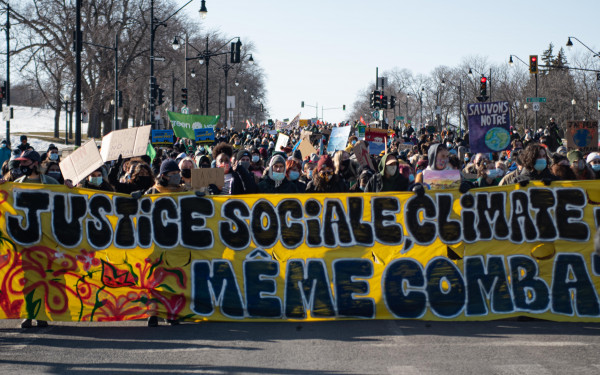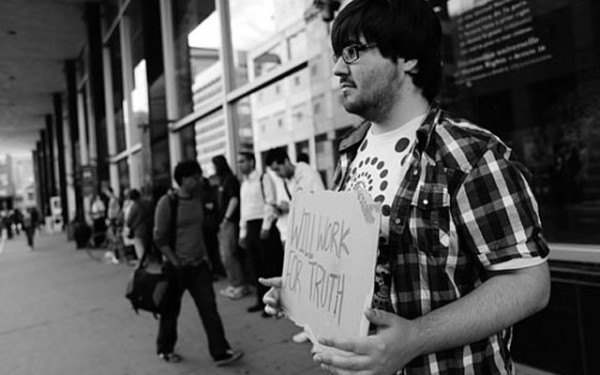Apocalypse Now?
Journalist Gwynne Dyer Talks Climate Change at Concordia
Grizzled international affairs journalist Gwynne Dyer was the first speaker brought in by the Concordia Student Union this year.
Before captivating an unfortunately mostly-empty auditorium in the MB Building Dec. 5 with a speech that touched on, among other things, the weather-related future of military conflicts, Dyer briefly sat down with The Link to talk climate change.
The forecast, according to the veteran war reporter, isn’t great.
The Link: What will it take for [climate change] policy to change drastically?
Gwynne Dyer: Oh, it’s got to change in a different level entirely. See all this conservation stuff—you paint your roof white, you don’t blast your air conditioning so much—this is cutting the power you use today, but they’ll get burned eventually if we go on using fossil fuels.
It’s like a bucket; it’ll fill up real fast if the tap is going full tilt, but even if the water’s running slowly, it will eventually fill up and overflow. You need to turn off the tap. The long-term answer—the only answer—is to stop burning and generating power with fossil fuels. That’s it.
We used them to get where we are, they’ve done us a favour but now we’ve realized the downsides, so we gotta stop. You’ve got lots of alternatives and, yeah they cost more, but, you know, would you like your planet raw or roasted? I’ll take mine raw.
In that sense, the whole business of conservation is important because it wins us more time to get the emissions down, relates to the fact that they’re a point of no return. But if the emissions come up, you lose control; you’ve got a runaway.
Is there any improvement under the Obama administration? I know you talked about the Bush years in your last book _Climate Wars but…_
Not a bit. Not one bit.
Okay, what do concerned citizens and journalists do to stay informed, especially when there’s some back-door stuff going on that we don’t have access to?
It’s true there are enormous amounts of back-door stuff that we don’t have access to.
What I tend to do is talk to retired generals. They won’t talk when they’re in uniform because they’re not allowed to, because they’re too busy, because they’re too important and tell me, ‘Go away, little man.’
But when they’re retired—three to six months out after 40 years of everyone jumping whenever they said anything and saying, ‘Yes, sir’ on the way up—nobody listens to them anymore. So what do you do? You phone him up and he’s so grateful to have someone to talk to, he’ll talk.
And maybe he signed the secret contract act, but he’ll skirt around that bit and [the journalists can] define what the problem looks like by the way he skirts around it.
How are reporters going to have to redefine how war caused by environmental devastation is covered? Does this complicate things?
Well, I’ve covered a lot of war, I’ve given up going to wars because it’s quite dangerous and every war looks the same from up front, right? The real questions are why this war? What is this about? Do you believe in the goals? Can it succeed, or is it simply a waste of money and life and nothing will change—Afghanistan for example. […]
But the one thing you can ask yourself about Afghanistan is, if it isn’t going to work in the long-term, why stay on for four more years and get people killed?
That’s the sort of thing you need to say about war, but you need to say it on the basis of facts, not just emotion and ideology.
The same is true about climate. You need to know how the system works. You need to talk to the scientists, the soldiers, the think tanks and the people who get contracts to deal with this stuff.
Once their contract is done, they’ll talk. They won’t reveal everything, but it’s amazing how you can discuss a subject, and never give away a secret, but the guy with the recorder walks away knowing everything. They’re doing it because they want to get it out.
This is a failing of mine; I should be more enthusiastic—I’m not a big conservation guy. It’s important, but it’s only important because we need more time to get the emissions down to zero, and not go through two degrees higher average global temperature. That’s where you lose control.
After that it doesn’t matter what you do in conservation, because there’s natural sources pumping carbon dioxide into the atmosphere. We could stop entirely and we might not be able to get off the curve we’re on.
So, if we need another 10 years, because we haven’t done anything this year, and we haven’t, why haven’t we?
Conservation will win you some time and that’s where it’s happening. If you actually do run through two degrees, if that’s going to happen, then you really are stuck.
But there is one last option, which is the geo-engineering.
Isn’t that a risky thing to advocate, since we don’t know the long-term effects of, you know, blasting sulphuric acid into the sky?
Well, sure, it’s a risky thing to advocate, but not advocating for it could be riskier. Nobody would talk about it three or four years ago. Scientists who even opened their mouths about it would suddenly lose all their friends and be ostracized by the profession.
It was what the industry called a “moral hazard”—if you let [people] know it could be done, they’ll do it. The problem is, of course, we don’t know what the side effects are. […]
Only very recently people are coming out of the woodwork, and what they really want to do is set up some rules for open-air limited experiments. Rules so that you can’t just go out and do it, you have to put your proposal before a board of scientists.
What about those people who don’t want to print climate change stories, or put a lid on this? I know your column has been discontinued in Canada before…
Oh, [media moguls Conrad Black and Izzy Asper] put a lid on me because they didn’t like what I wrote about the Middle East, but that was a long time ago.
More generally, I think if you’re a freelancer, and I am and always have been, you just find an outlet that will use and pay you for it. I see no point in banging my head against the wall.
If Conrad Black doesn’t want me in his papers, fine. What I did was I went out and sold it to all the alternate weeklies—they pay better anyways. You find yourself alternative outlets and you go on writing what you want.
I never actually consult with anybody before I write. If they don’t want it, they don’t have to use it, and if you hate my guts you can pull it entirely. No problem. I’ll find someone else.
Where does the military fit into this?
Almost all of the work that the military foresee for themselves in the warming world comes from a shortage of food. Rule of thumb among scientists is that you lose 10 per cent of food supply for every degree Celsius higher of average global temperature.
We live in the right kind of world for global deal-making… but get deeper into warming, let the famine start, let the refugees start, let the killing start and you won’t have that world for very much longer.
Your prognosis suggested that 2045 was the end-time date. That’s a little apocalyptic…
No, no. It’s very apocalyptic.
Okay, it’s very apocalyptic. And a lot of people are feeling discouraged and asking, pardon my language, what the hell’s the point? Especially youth and university students who…
Oh, come on. This is mostly posing, to be frank. The line when I was [growing up] was, ‘We have no future anyways, because we’re all going to be blown by the bomb, so get on with it.’ Today it’s, ‘We have no future because we’re going to fry.’
Well, really? I mean, terrible things sometimes do happen, but this doesn’t have to come with big boots on if we get a handle on it and get ahead of the process.
The hardest bit is going to be making the deals, see. What you gotta do is to get everybody to sign up, and it’s got to be done at the national level. […]
What that means is that you have to make a deal between the rich countries and the poor countries. And what the rich countries don’t understand and what all the poor countries all know is that there’s a bunch of history behind this, which means you can’t ask everyone to make equal sacrifices.
The old, rich countries like our own have been omitting carbon dioxide in significant quantities, fossil carbon dioxide, for 200 years. Eighty per cent of the crap up there causing the crisis is ours: Canada, U.S., Europe, Russia, Japan. That’s it, full stop, maybe Australia.
You can’t go out to the Chinese now, as we do, and say, ‘Big crisis, guys. We all have to take deep cuts. Equal cuts all around.’ That won’t fly. They’re still poor, their per-capita emissions are far lower and they’re not responsible for the stuff that caused the crisis in the first place.
If China was the only one industrializing and the West had never existed, they would have another 100 years before hitting the wall. [The West] filled the bucket up, and now there’s a crisis. So, it’s got to be a much more complicated deal where the West takes bigger cuts.
We’ll need to cut deeply and subsidize them so they can go on growing their economy, and put in more power—but clean power, not fossil fuels. That costs more money, so who pays for it? Well, we’ll have to.
This is very hard to explain this to the Western electorate. That whole question of historical responsibility is completely alien to the conversation around here. Nobody says it, but everyone knows it in Brazil and China, I promise you. Everyone.

_806_700_90.jpg)




